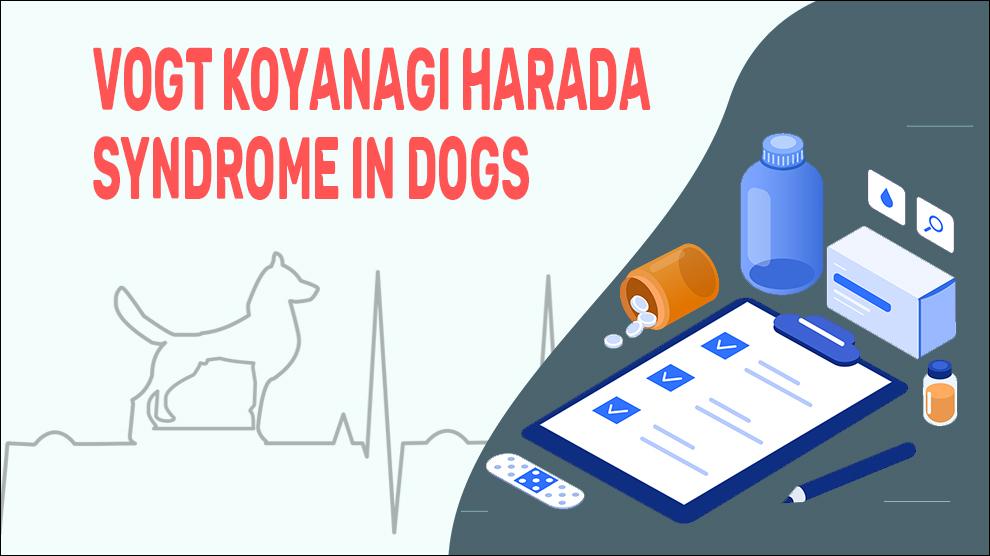What Is Vogt Koyanagi Harada Syndrome In Dogs?
Vogt Koyanagi Harada disease (VKH) is a rare, multisystemic, granulomatous inflammatory disorder that specifically affects pigmented structures, such as the inner ear, eye, meninges, hair, and skin.
Descriptions about this condition date back several centuries ago, however, the immune-mediated granulomatous disease is named after three 20 century researchers who illustrated the combined manifestations of this disorder. Initially, Switzerland physician Alfred Vogt described eyebrow depigmentation and bilateral iridocyclitis in 1906, followed by Japanese researcher Yoshizo Koyanagi’s 1926 description of cerebrospinal fluid (CSF) pleocytosis in association with bilateral serous detachments. And shortly thereafter, another Japanese researcher Einosuke Harada found out the integumentary symptoms of the condition.
In both its early and late manifestations, this relatively rare condition has a distinct phenotypic picture. The pathophysiologic mechanism behind VKH has been difficult to categorize regardless of exclusive clinical findings. In the last decade, some of the immunologic and genetic facets of VKH have been explicated owing to recent technological advances. There are several ophthalmic complications from this condition, and early diagnosis and treatment can decrease morbidity.
The exact etiopathogenesis of VKH is not decisively established, but recent theories hypothesize that after recovery from a disturbing viral environmental factor, dogs build up T-cell-mediated immunity against melanocytes. Epstein Barr virus and Cytomegalovirus have been concerned in the disease progression, but no significant association has been identified. VKH is considered to be caused by the intolerance of melanocytes, causing a non-necrotizing granulomatous inflammation in the inner ear, eye, hair, and skin.
Symptoms Of Vogt Koyanagi Harada Syndrome In Dogs
- Bloodshot eyes
- Inflammation of the eyes
- Squinting
- Excessive tearing
- Light hypersensitivity
- Whitening of the skin, coat, lips, nose, scrotum, footpads, and nails
Retinal detachment, cataracts, or secondary glaucoma may cause the following symptoms:
- Swelling of the orb
- Cloudy cornea
- Impaired vision or blindness
- Front portion of the eye becomes inflamed/discolored
- Bulging eyes
- Dilated pupils with no or slow pupillary light reflex
Treatment Options For Vogt Koyanagi Harada Syndrome In Dogs
- No treatment is necessary until the inflammation is stable. When the pupil is obstructed or any other secondary complications are observed or vision is getting impaired, step-wise medical intervention is required.
- Anti-inflammatory medications, Pain Control Medications such as NSAIDs, and Antibiotics will be used to control infection and inflammation.
- Rhegmatogenous detachment: surgery that includes vitrectomy, titanium tacking, Laser retinopexy, and use of expandable gases.
- Intravenous fluids for Hyperviscosity and other circulatory disorders.
- Congenital detachments and degeneration of the retina-associated detachments- There are no treatments for this type of retinal detachment.
- For glaucoma
β Blockers: Levobetaxolol/ Betaxolol
Carbonic Anhydrase Inhibitors: Acetazolamide, methazolamide, Dorzolamide and Brinzolamide
Cholinergic Agents: Neostigmine, galantamine, edrophonium, rivastigmine
Prostaglandin Analogues: Bimatoprost, Travoprost and Latanoprost
Hyperosmotic Agents: Oral glycerin/ Mannitol
Home Remedies For Vogt Koyanagi Harada Syndrome In Dogs
VKH-prone breeds must have their eyes checked frequently so that cases can be identified and treated as early as possible.
Always monitor for any irregularities with the eyes and check with your vet as soon as possible.
How To Prevent Vogt Koyanagi Harada Syndrome In Dogs?
- There is no real way to prevent VKH syndrome. Some of the breeds inherit the condition and others acquire it through other health issues
- Consult with breeders/vets to find out if the breed has a history of vaginal inflammation
- Prevention of VKH is a hereditary concern.VKH affected Dogs including First degree relatives (parents and littermates) should not be bred so as to avoid passing the condition on to the next generation
Affected Dog Breeds Of Vogt Koyanagi Harada Syndrome
American Cocker Spaniel, Bedlington Terrier, Beagle, Border Collie, Cocker Spaniel, French Bulldog, Golden Retriever, Gordon Setter, Labrador Retriever, Rottweiler, Pekingese, Samoyed, Scottish Terrier, Schnauzer, Shetland Sheepdog, Shih Tzu, West Highland White Terrier, Akita, Irish Setter, Siberian Husky, Saint Bernard, Australian Shepherd, Puppies, Senior Dogs
Causes And Prognosis For Vogt Koyanagi Harada Syndrome In Dogs
1. Causes:
- Hereditary
- Auto-immune disease
2. Mortality:
There is no documented mortality connected with VKH. Older dogs are at greater risk of getting incapacitated than younger dogs.
3. Diagnosis:
- A complete blood count (CBC), chemistry profile
- Tonometry, slit lamp, and fundoscopy
- Biomicroscope
- Inner eye gonioscopy
- Corneal stain testing
- Conjunctival cytology or biopsy
- Intraocular pressure testing
4. Prognosis:
The prognosis for recovery for dogs diagnosed with Vogt-Koyanagi-Harada syndrome is guarded with today's medications available. Although there is no known cure for VKH syndrome in dogs, most dogs enjoy a pain-free life with long-term immunosuppressive medication.
Follow-up of the veterinarian’s treatment plan is crucial. When the condition is not identified earlier in the course of the progression or if it has developed into a serious condition like glaucoma, the pet may not respond fully to the treatment or it may lose its vision.
When To See A Vet For Vogt Koyanagi Harada Syndrome In Dogs?
- Bloodshot eyes
- Inflammation of the eyes
- Squinting
- Excessive tearing
Food Suggestions For Vogt Koyanagi Harada Syndrome In Dogs
- Nonmeat/plant protein sources such as potatoes, nuts, lentils, beans, quinoa chickpeas, soybeans, green peas, etc
- Cruciferous vegetables, such as Cabbage, collards, broccoli, cauliflower, and kale
- Fresh vegetables/fruit (banana, carrots, green beans, apple, orange)
- Omega 3 fatty acid foods (avocados, flaxseeds, Sardines, salmon, Mackerel, Herring, etc)
- Antioxidant berries such as blueberries, Strawberries
- Zinc foods such as Red meat (including beef, chicken, lamb, pork, and duck), tuna, king crab, pumpkin seeds, and Oysters
Conclusion
The prognosis for return of vision is poor to guarded. Once therapy has been started, some loss of vision may reverse but the complete return of vision is uncertain.
After the initial treatment, monthly check-ups are recommended and vision has to be closely monitored. Eye medications have to be administered according to the vet’s instructions.

















